"Great Divergence" is a term made popular by Kenneth Pomeranz's book by that title, (also known as the European miracle, a term coined by Eric Jones in 1981)[3] referring to the process by which the Western world (i.e. Western Europe and the parts of the New World where its people became the dominant populations) overcame pre-modern growth constraints and emerged during the 19th century as the most powerful and wealthy world civilization" (källa)Det finns en omfattande debatt kring "Great Divergence". Inom kursen Miljöhistoria fokuseras på de förkaringar som har en biologisk förklaring (beskrivs även som "miljödeterminism"). Här fokusers två författares förklaringar, Crosby och Diamond:
Som man kan se i nedanstående diagram kan Great Divergence dock inte förklara varför Indien och Kina tappade tillväxt mellan 1850-1950:
Nedan hur relativa utvecklingen mellan åren 0 och 2003 kan beskrivas (här kan noteras hur Indien och Kinas tillväxt stiger markat de sista 40 åren) (källa):

Hurvudtemat för dagen var som sagt att blicka in i två böcker som förklarar varför Euroasien utvecklats mest (vilket ibland "sammanfattas" med begreppet "Great Divergence").
En bok om som förklarar varför vissa länder utvecklats mest mellan åren 900 och 1900, är Alfred Crosby (1986) "Den ekologiska imperalismen: Europas biologiska expansion 900-1900" (The Ecological Imperialism) (Library Thing) (Google Book) (Bokus)
Ecological imperialism is the theory advanced first by Alfred Crosby that European settlers were successful in colonization of other regions because of their accidental or deliberate introduction of animals, plants, and disease leading to major shifts in the ecology of the colonized areas and to population collapses in the endemic peoples. The many pathogens they carried with them adversely affected the native populations of North America, Australia, and Africa, and were far more destructive than weaponry: it is estimated that disease wiped out up to 90 percent of indigenous people in some locations.
En annan som har tänkt mycket på "Great Divergence" är Jared Diamond vilket framgår i boken "Guns Germs and Steel" (1997, Bokus, Adlibris-bok). På svenska "Vete vapen och virus", 2006 (slutsåld på Bokus) Nordstedt) (Open Library). Några är kritiska till boken. Det har dock gjorts en film på boken:



Inga kommentarer:
Skicka en kommentar